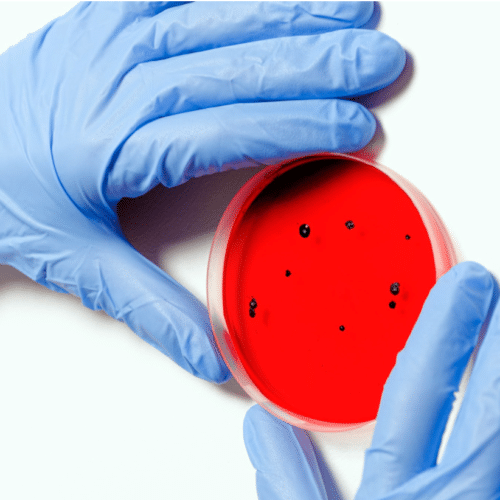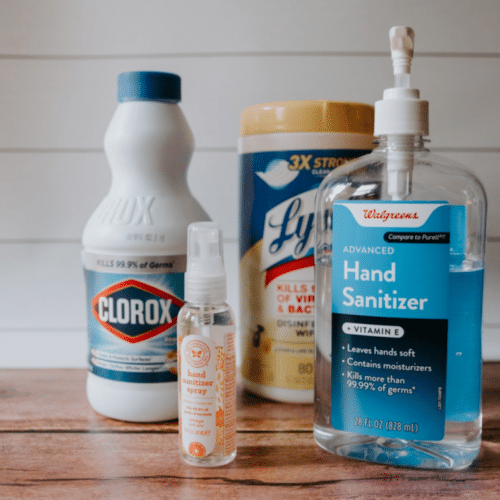If you haven’t seen the viral video about how quickly germs can spread in a public space {such as a restaurant}, it’s time to watch. And no, not because you should be scared or have coronavirus-related anxiety about going out in public as the country begins to slowly reopen. You should watch it because as we move into this next post-coronavirus phase of life, “normal” looks different than it used to. The most effective way to protect yourself is to stay informed.
The viral video was made by the public broadcasting organization NHK with the help of health experts, CNN reports. The goal of the video is to use black light technology to illuminate how quickly coronavirus and other germs can spread in a public place.

In a simulated environment reminiscent of a buffet-style restaurant or even a cruise ship, the experiment defines one person as infected by putting a fluorescent substance on their hands. This substance is only visible with a black light and represents germs from either a cough or sneeze. Then, everyone utilizes the buffet as they normally would, without taking any special safety precautions.
See More: 10 Tips for Reducing Anxious Thoughts and Fear During COVID-19
At the end of the video, the black light turns on and we see where the “germs” have spread to: on the food, utensils, plates, the hands, and even the faces of some of the other restaurant-goers.
YUCK!
Again, the point here is not to freak anyone out, but to prepare people for this next phase of life after coronavirus. As restaurants slowly begin reopening and other non-essential businesses are permitted to open their doors again, here’s everything you need to know about avoiding germs in public — specifically in restaurants — and how you can prevent yourself {and your family} from getting sick.
How Far Can the Coronavirus Spread Through the Air?
You’ve probably heard about “the droplets.” This is how coronavirus is now widely being referred to when we talk about the spread of the virus. When a person sneezes or coughs, it produces little aerosolized droplets that can travel through the air more than 1 meter {or 3 feet}, according to the Center for Disease Control and Prevention {CDC}.
The CDC and the Ethics Committee of the Guangzhou Center for Disease Control and Prevention approved an investigation into the effects air conditioning could have on the potential travel length of a coronavirus droplet.
Their website says:
Virus transmission in this outbreak cannot be explained by droplet transmission alone. Larger respiratory droplets {>5 μm} remain in the air for only a short time and travel only short distances, generally <1 m {2,3}. The distances between patient A1 and persons at other tables, especially those at table C, were all >1 m. However, strong airflow from the air conditioner could have propagated droplets from table C to table A, then to table B, and then back to table C {Figure}.
In short, increased airflow from an air conditioner was found to potentially propagate coronavirus droplets further than they maybe would have traveled on their own.
How Long Can Coronavirus Survive on Surfaces?
According to a recent study published on Harvard Medical School, coronavirus can survive on copper for up to four hours, on cardboard for up to 24 hours, and up to 2-3 days on both plastic and stainless steel surfaces.
There have been no specific estimates for how long coronavirus could potentially survive on a restaurant tabletop, however, this is why frequent cleaning is crucial to stopping the spread of coronavirus.
How to Avoid Germs in Restaurants

Excuse us for sounding like a kindergarten teacher but EVERYONE NEEDS TO WASH THEIR HANDS. Like, everyone — you, your kids, us — everyone. Thorough hand-washing is one of the most effective ways to stop the spread of coronavirus and other nasty germs.
As per the CDC’s current recommendation to all food and restaurant workers, restaurant management, and food safety programs should be doing the following to prevent the spread:
- — Review restaurants’ practices and surroundings in light of the findings of this study and highlight potential barriers to and supporters of hand hygiene.
- — Know that efforts to improve hand hygiene in restaurants should address the factors that affect hand hygiene behavior.
- — Revise food-preparation activities to lower the number of needed handwashings. For example, a sandwich-making process could be revised to lower the number of times a worker has to handle raw meat. This would lower the number of handwashings needed and should increase the odds that workers will wash their hands as needed.
The CDC also recommends that all people wash their hands after the following activities: eating, drinking, using tobacco, coughing, sneezing, using a tissue, preparing raw animal products, handling dirty equipment, and touching your own body {including scratching your nose}.
According to WebMD, the menu is one of the germiest things inside a restaurant. Wash your hands or use antibacterial hand sanitizer after touching the menu. The most common bacteria strands found on menus include E. coli and S. aureus {AKA Staph}.
WebMD also recommends avoiding buffet-style restaurants and salad bars and to give shared condiments like ketchup and mustard a wipe-down before pouring on your food.
Read More: A Holistic Guide to Surviving Spring Allergies
Safe Practices in Public
Here are a few practices to implement on your own time to help keep yourself and others safe.
Continue to social distance: Stay at least six feet apart from people, besides the people you live with or have quarantined with. When sitting in a restaurant, make sure the chairs are six feet apart. Restaurants are required to do this right now as well.
Bring hand sanitizer with you: For moments when a sink isn’t available or you feel awkward running to the sink every five minutes, having hand sanitizer or wipes on hand will work, too. Sanitize your hands after touching a restaurant menu, doorknobs, and when you leave a restaurant, sanitize your hands again once you get in the car or get home.
Take your shoes off after you get home: There are a ton of germs on the floor and the soles of your shoes pick them up all day long. To avoid bringing these germs back into your home, take your shoes off outside and don’t wear your shoes indoors unless they’ve been through the washer.
Wear a mask: Yes, even still. Whenever you’re walking outside, passing people, or sitting down at a restaurant talking to a waiter or waitress, wear a mask. If people aren’t within six feet of you and your food is on the table, take your mask off to eat. If you go to the bathroom or talk to anyone else in the restaurant, put your mask back on.
What to Ask the Restaurant

Don’t be afraid to ask hard, sometimes awkward questions to the restaurant owner, hostess, waiter, or waitress. You deserve to make sure you and your family are safe. You may want to ask how often they clean the tables, the menus, the cutlery, the plates, their kitchen surfaces in the back, and yes, the bathrooms. You may also want to ask if they have any hand sanitizer available should you forget to bring your own. Anything else that comes up, don’t be afraid to ask. It’s your health on the line.
Got a news tip? Let us know — email us at hello@hobokengirl.com! We appreciate it.
Check out Hoboken Girl’s new Job Board here!










